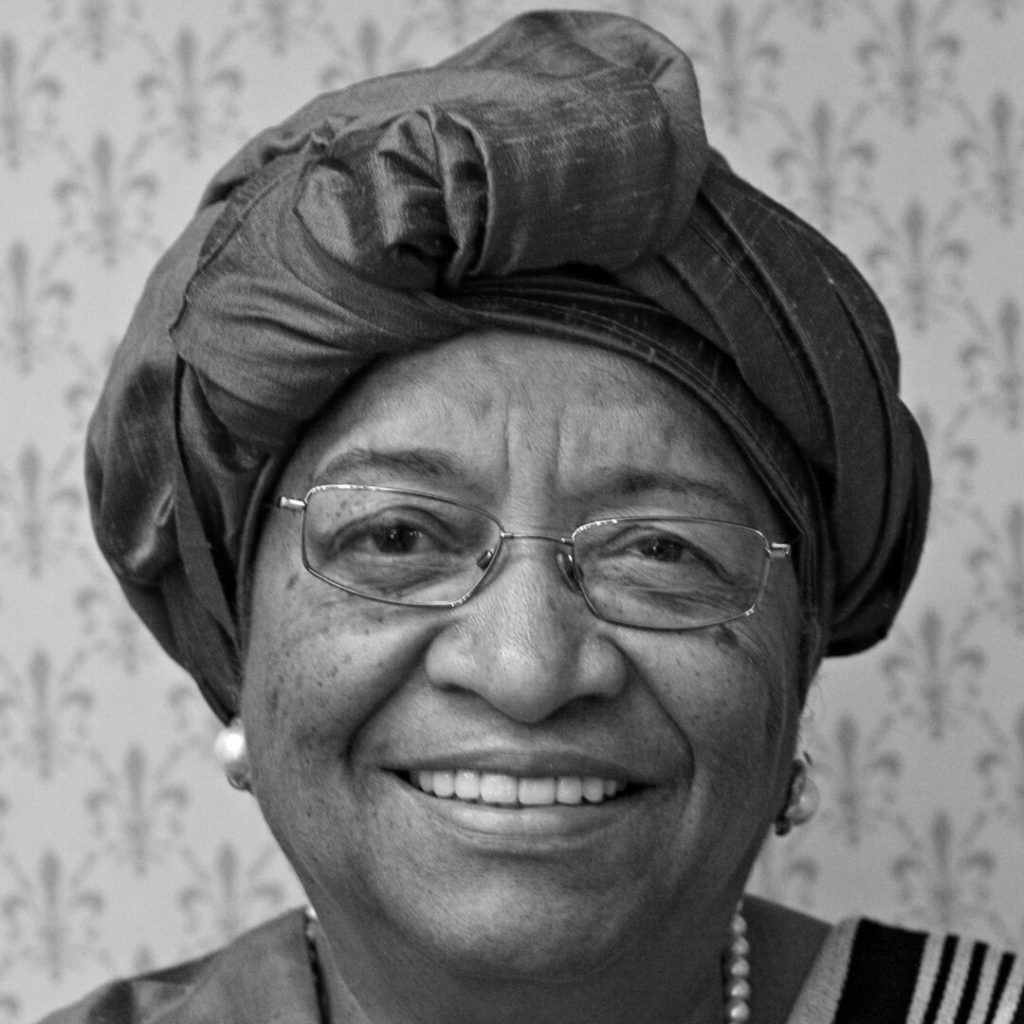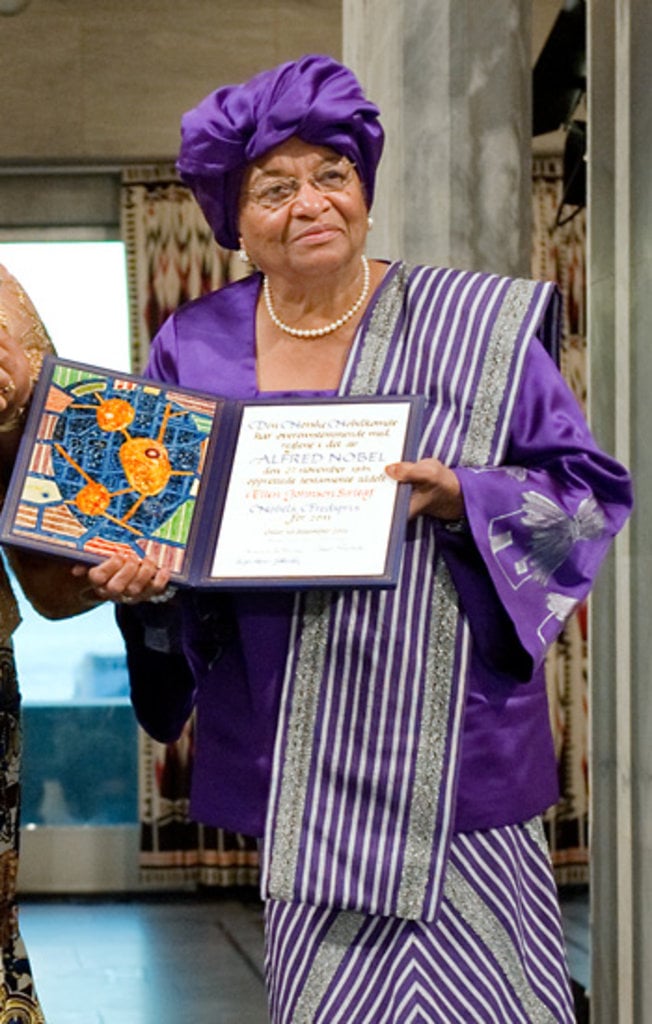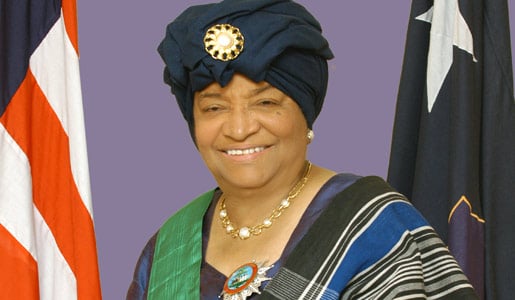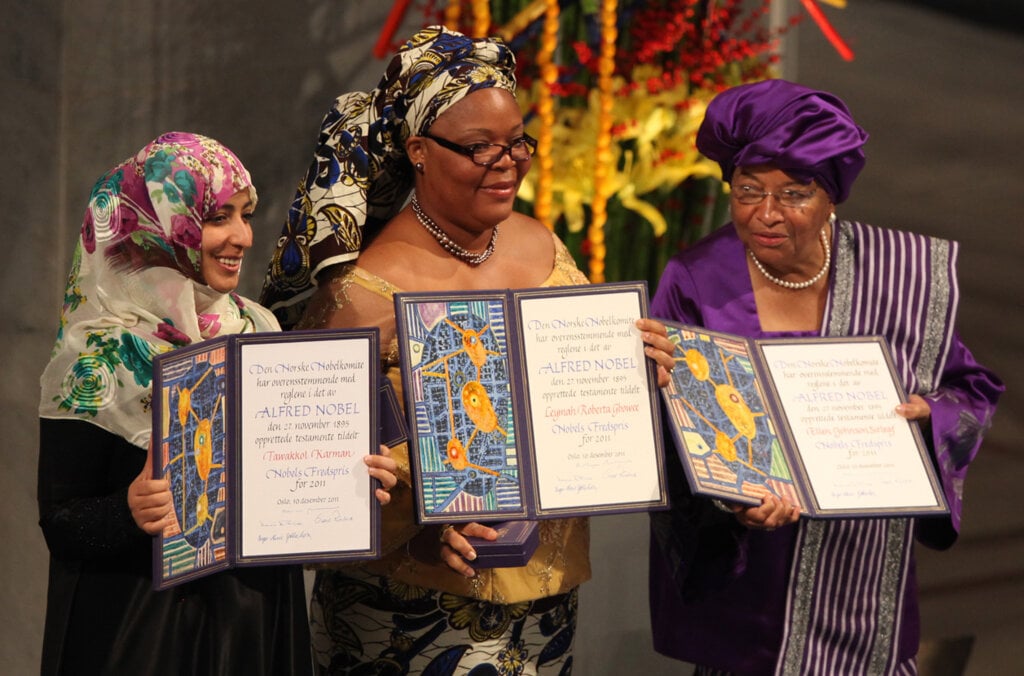Ellen Johnson Sirleaf
Speed read
Ellen Johnson Sirleaf was awarded the Nobel Peace Prize, jointly with Leymah Gbowee and Tawakkol Karman, for her non-violent struggle for the safety of women and for women’s rights to full participation in peace-building work.

Full name: Ellen Johnson Sirleaf
Born: 29 October 1938, Monrovia, Liberia
Date awarded: 7 October 2011
Pioneering president
Ellen Johnson Sirleaf is Africa’s first democratically elected female president. Sirleaf held several government positions in Liberia during the 1970s. During the 1980s and 1990s she ran for election as vice president and president, which resulted in house arrest, imprisonment and defeat. During the 1990s she held senior positions in international banks and led the UN Regional Bureau for Africa. After the fall of dictator Charles Taylor in 2003, she was elected President in the first democratic election in 2005. In 2006, Sirleaf established Liberia’s Truth and Reconciliation Commission after decades of bloody conflict. The Norwegian Nobel Committee emphasised Sirleaf’s contribution to securing peace in Liberia, promoting economic and social development, and strengthening the position of women.
"We cannot achieve democracy and lasting peace in the world unless women have the same opportunities as men to influence the development of society at all levels."
- The Norwegian Nobel Committee, Oslo, 7 October, 2011.

"If your dreams do not scare you, they are not big enough."
- Ellen Johnson Sirleaf, This Child Will Be Great: Memoir of a Remarkable Life by Africa's First Woman President, 2010.
Difficult road to democracy
Harvard-alumni Ellen Johnson Sirleaf represents the Unity Party, and held several government positions in Liberia during the 1970s. After Samuel Doe’s coup d’état in 1980, she left the country, returning to run for vice presidency in 1985. She was put under house arrest and sentenced to 10 years in prison. The year after, she went into exile. Sirleaf initially supported Charles Taylor’s revolt against the Doe regime, but later withdrew it. In 1997, she ran for the presidency against Taylor, but lost in a heavily disputed election. After several attempts, she won the presidential election in 2005.

Photo: Ministry of State for Presidential Affairs, Liberia Brazil
The Nobel Peace Prize and Resolution 1325
In 2000, the UN Security Council adopted Resolution 1325. The resolution made attacks against women in times of war a matter of international security. In its announcement of the peace prize 2011, the Nobel Committee emphasised the need for women to have the same status as men in peace efforts. During the follow-up phase to the resolution, Ellen Johnson Sirleaf contributed to the report “Women, War and Security”, which contains proposals for how to involve women in peace efforts. Sirleaf made sure that Liberia was among the first countries to have a national plan for implementing Resolution 1325.
Major rebuilding required
Liberia is still struggling with the material and social fallout from 14 years of brutal civil war that began with the revolt and assassination of President Samuel Doe in 1989. Doe had himself seized power a decade earlier in a military coup, subsequently executing the former president, most of his cabinet and other government officials. By 2003, 270,000 people had been killed, 1/3 of the population had fled their homes, and the country’s economy and infrastructure had largely ceased to function. In other words, the country had to be rebuilt almost from scratch.
Three share the peace prize
The Nobel Peace Prize 2011 was awarded equally to Ellen Johnson Sirleaf, Leymah Gbowee and Tawakkol Karman. They got the prize for their non-violent struggle for women’s security and the right to full participation in peace-building activities. This is the second time in the peace prize’s history that it is awarded to three individuals. The first time was in 1994, when the prize went to Yasser Arafat, Shimon Peres and Yitzhak Rabin for their efforts to bring peace to the Middle East.

Learn more
Internationally known as Africa’s “Iron Lady,” President Ellen Johnson Sirleaf is a leading promoter of peace, justice and democratic rule. She grew up in Liberian capital of Monrovia, where she married and had four sons ...
Disclaimer: Every effort has been made by the publisher to credit organisations and individuals with regard to the supply of photographs. Please notify the publishers regarding corrections.
Nobel Prizes and laureates
Six prizes were awarded for achievements that have conferred the greatest benefit to humankind. The 14 laureates' work and discoveries range from quantum tunnelling to promoting democratic rights.
See them all presented here.
